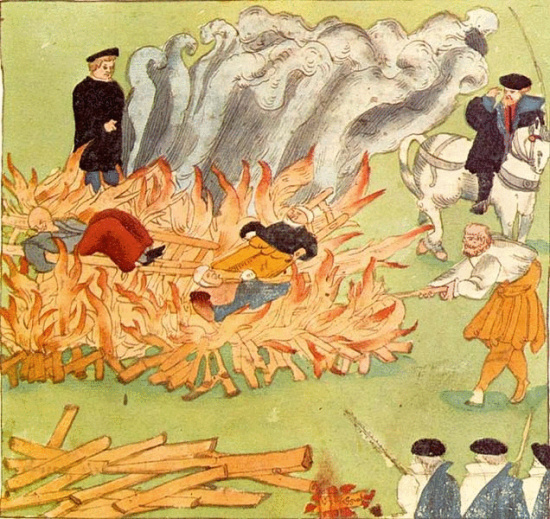Twenty-five years from now the war we undertook against al-Qaeda won’t seem nearly as important as the wars we waged against physics and math.
— Thomas Friedman & Michael Mandelbaum, That Used to Be Us
###
Execution of three witches on November 4, 1585 at Baden, Switzerland. (Unknown artist, collection of Johann Jakob Wick, Zurich. Wikimedia/public domain)
Broadly speaking, we understand the world in two ways: reason and belief. Belief, the feeling that something was true, got us through a few hundred thousand years of bare survival in Africa, through the diaspora into Asia and Africa (and later into Australia and the Americas). Then, starting perhaps with Thales of Miletus around 2,600 years ago, empirical reason began to take precedence over belief. It still took awhile before we figured out that sacrificing to the rain gods didn’t really do much good, or that brains resided in our heads, not our hearts, or that witches weren’t agents of the devil who deserved to be burned to death — but by 1700 AD or so, reason was informing us in ways unempirical belief never could have. Belief would never have given us electricity, polio vaccine or smartphones.
By “reason,” I mean the scientific method, of course, i.e. the testing the validity of a hypothesis experimentally. One definition of a scientist may be, someone who accepts the result of an experiment, even though that result runs counter to their beliefs. While science is fallible — DDT and thalidomide come to mind — overall it’s a more reliable road to truth than any of the alternatives.
Yet today, with so many crises to deal with, many of us find it easier to revert to folk wisdom ways of thinking rather than to pay attention to rational, scientific solutions. For instance, the “natural good, artificial bad” mantra dominates much thinking on what we eat. Does this mean it’s OK to drink nature’s-own hemlock? Should we avoid eating “artificial” fruit? All fruit we eat today is artificial, whether created by selective breeding, hybridization, irradiation mutagenesis or direct genetic manipulation.
Recapping the last option, many of us avoid GMOs, which, according to science — in this case, the Royal Society of Medicine — have “been consumed by hundreds of millions of people across the world for more than 15 years, with no reported ill effects.” Right now, the pest resistance and increased yields offered by GMOs offer the best chance for developing nations to counter the effects of drought and rising sea levels.
Which brings us to climate change. These facts are incontrovertible: (1) the concentration of the greenhouse gas CO2 in the atmosphere has increased by 40% since the start of the Industrial Revolution; (2) Earth has warmed by nearly one degree Celsius in the past 100 years (about ten times faster than the warming following the last ice age). What is also unarguable is that virtually all climate scientists agree (1) and (2) are linked: the CO2 we (i.e. advanced nations, mostly) release through burning coal, oil and gas is causing the warming. Yet less than half of us (10% of Republicans, 78% of Democrats) agree with this; it seems that belief, masquerading as unquestioned party loyalty, has taken the place of rational thinking.
Two more examples where belief often outsells reason:
Vitamins: We love vitamins — nearly $30 billion a years-worth of them in the U.S. — even while science insists “their use is not justified and they should be avoided,” according to the Annals of Internal Medicine.
Vaccines: The best medical science says there’s no link between autism and childhood vaccines. Yet one third of us believe otherwise. And meanwhile, one in ten unvaccinated persons in a population can lead to an epidemic.
So here’s the irony: at a time when the best approach to responding to both personal and global problems is the scientific method, we’re abandoning it in ever-increasing numbers.
###
Barry Evans gave the best years of his life to civil engineering, and what thanks did he get? In his dotage, he travels, kayaks, meditates and writes for the Journal and the Humboldt Historian. He sucks at 8 Ball. Buy his Field Notes anthologies at any local bookstore. Please.

CLICK TO MANAGE